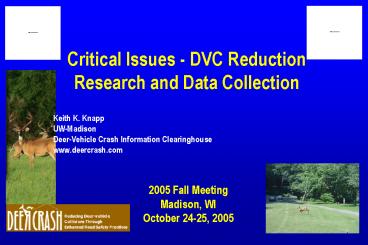Critical Issues - DVC Reduction Research and Data Collection - PowerPoint PPT Presentation
1 / 21
Title:
Critical Issues - DVC Reduction Research and Data Collection
Description:
Critical Issues - DVC Reduction Research and Data Collection Keith K. Knapp UW-Madison Deer-Vehicle Crash Information Clearinghouse www.deercrash.com – PowerPoint PPT presentation
Number of Views:186
Avg rating:3.0/5.0
Title: Critical Issues - DVC Reduction Research and Data Collection
1
Critical Issues - DVC Reduction Research and Data
Collection
Keith K. Knapp UW-Madison Deer-Vehicle Crash
Information Clearinghouse www.deercrash.com
- 2005 Fall Meeting
- Madison, WI
- October 24-25, 2005
2
PRESENTATION CONTENT
- Research Deer-Vehicle Crash Countermeasure
Toolbox - Objective and Content
- General Findings, Category Conclusions, and
General Recommendations (Safety Focus) - Data Collection Regional Data Management and
Information Survey - Recall Objectives
- Conclusions and Concerns
- Recommendations
3
THE TOOLBOX
- Objective Provide Detail Needed to
Support/Defend DVC Countermeasure Application
Decisions and Choices - Current Knowledge Related to
DVC Reduction Effectiveness - Exec. Summary and Three Chapters
- 16 Countermeasures Considered
4
THE COUNTERMEASURES
- Roadside Vegetation Management
- Hunting or Herd Reduction
- Exclusionary Fence
- Roadway Development Decisions/Policies
- Public Information and Education
- Wildlife Crossings
- Noise/Sound/Whistle Devices
- Reflectors/Mirrors
- Deer-Flagging Models
- Deer Crossing Signs
- Intercept Feeding
- Speed Limit Reduction
- Highway Lighting
- Repellants
- Deicing Salt Alternatives
- In-Vehicle Technologies
5
GENERAL FINDINGS
- Multitude of References (500)
- Comparably Few Valid, and Well Designed and
Documented Studies - Many Conflicting or Inconclusive Research Results
- Variability and/or Validity of Data and Approach
- Time, Area, and Dollars
6
GENERAL FINDINGS (Cont.)
- Definitive Studies of Countermeasure
DVC-Reduction Effectiveness are Rare - One Common Solution Unlikely
- Work Required to Match/Focus Measure(s) to
Locations - Definitively Exclude/Include Widely Used
Measures, and Properly Evaluate New Measures
Upfront
7
COUNTERMEASURE CATEGORIES
10 of 16 Measures Used but Rarely/Never Been
Studied or with Conflicting Results
- Deer Whistles
- Roadside Reflectors/Mirrors
- Speed Limit Reduction
- Signs and Sign Technology
- Hunting and Herd Reduction
- Roadside Vegetation Management
- In-Vehicle Technologies
- Deicing Salt Alternatives
- Public Information and Education
- Roadway Maintenance, Design, and Planning Policies
8
CATEGORIES (Cont.)
- 2 of 16 Measures Used with Generally Positive
Results - Exclusionary Fencing
- Wildlife Crossings
- 4 of 16 Measures Not Generally Used but Rarely
Studied - Roadway Lighting
- Deer-Flagging Models
- Intercept Feeding
- Repellents (on Roadways)
9
CATEGORIES (Cont.)
- AASHTO Safety Plan Strategy Categories
- Experimental
- Tried
- Proven
- Concluded all But 2 DVC Countermeasures were
Experimental or Tried - Fencing and Crossing Safety Analysis Work also
Stills Need Improvement
10
GENERAL RECOMMENDATIONS
- Measures Used with Conflicting Results and
Tried - Definitively Determine
Positive/Negative Safety Impacts - Measures Used with Positive Results and Generally
Proven - Apply Currently Accepted Standards of
Safety Data Analysis and Answer more Detailed
Application Questions
11
RECOMMENDATIONS (Cont.)
- Measures Used but Rarely Studied and Tried -
Proper Study of Effectiveness (Replicate and
Improve on Past Limited Evaluations) - Measures Used but Rarely Studied and
Experimental - Pilot Study Application with
Currently Accepted Standards of Safety Data
Analysis
12
RECOMMENDATIONS (Cont.)
- Measures Used but Not Studied and Tried or
Experimental - Initial Evaluations and/or Pilot
Study Applications Required - Measures Not Generally Used but Rarely Studied
and Experimental - Proper Evaluation at a Pilot
Study Level to Refute/Confirm Previous Individual
Study Results
13
REGIONAL SURVEY OBJECTIVES
- Share DVC-Related Data Characteristics and
Collection/Management Procedures Used by
Individual States with DVCIC Partners and Beyond - Allow Proper DVC-Related Data Comparisons Between
and Within States - Allow Proper DVC-Related Data Combinations within
Region Annually and from Year to Year within
States
14
SURVEY CONCLUSIONS
- Annual Deer Population Estimates done Pre- or
Post-Hunt at DMU or County Level - DNRs Rarely Consulted on Roadway Planning
Projects about Animal/Vehicle Conflicts - DNR Officers and Others Issue/Record Carcass
Salvage/Possession Permits - A Few Combine/Summarize Permits and Removals if
Data is Collected as Estimate of Actual DVCs
(Some Also Collect Location)
15
SURVEY CONCLUSIONS (Cont.)
- For Most States Carcass Removal is Primarily a
State and Local DOT Job - Done When Needed, but
Usually not Recorded - Reported DVC often Means Something Different to
DNR and DOT - DNRs Typically Not Consulted about Deer Crossing
Sign Locations - Similar Issues Occur Nationwide
16
DVC DATA CONCERNS
- Typical PDO Data Characteristics
- Under-Reporting
- Specificity of Location
- Different Minimum Reporting Thresholds
- Relevant Database Locations
- Intra-agency
- Interagency
- Interdisciplinary
- Public, Private, and Non-Profit
- Federal, State, County, and Local
17
DVC DATA CONCERNS (CONT.)
- Poor Documentation of Data/Terminology in DVC
Summaries and Research - For Example in Past Reports
- DVC Roadkill Observed, Roadside Permit
Numbers, and Officially Reported Crashes - These are NOT Equal in Magnitude or Location
- Possible that Best Data is not Generally
Collected/Recorded by Location - Lack of Species-Specific Crash Input
18
DVC DATA CONCERN IMPACTS
- Definition of Overall Problem and Problem
Locations - Spatial and Temporal Combinations and Comparisons
- Understandability and Usefulness of DVC Safety
Research Results - The What and Where Questions of Implementation
19
RECOMMENDATIONS
- Continue to Encourage Activities that Increase
Reporting and Locational Accuracy - Properly Define Available DVC-Related Databases
Statewide, Regionally, and Nationally - Properly Document Magnitude, Trends, and/or
Location of DVC Problem Statewide, Regionally,
and/or Nationally
20
RECOMMENDATIONS (Cont.)
- Encourage Quality Control of Standard DVC
Countermeasure Research and its Documentation - Pilot Study Collection/Recording of Roadside
Carcass Locations - Compare to Reported DVCs - Encourage DVC Countermeasure Implementation and
Monitoring by Multidisciplinary Teams
21
Questions and Discussion
Website www.deercrash.com































